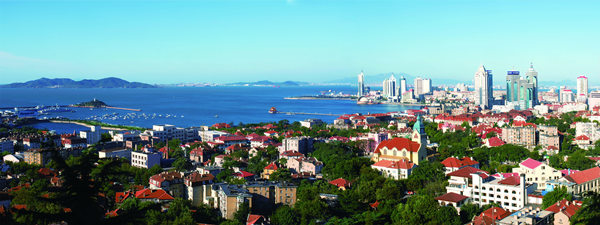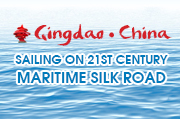Qingdao meets demand for wealth management
By ZHONG NAN and XIE CHUANJIAO ( China Watch )
Updated: 2015-10-30
|
|||||||||
 |
|
Qingdao, with its typical red tile roofs, green foilage, blue sky and sea views, is home to China's only wealth management finnacial zone. Provided to China Daily |
Approved by the State Council in February 2014, the Qingdao Wealth Management Financial Comprehensive Reform Pilot Area, the country’s only wealth management financial zone, has attracted 24 large-scale financial institutions to establish branches in Qingdao, Shandong province.
The zone is home to more than 210 domestic and foreign financial institutions including HSBC Holdings Plc. and Bank of East Asia.
Eleven banks including Bank of China, Bank of Communications, and Shanghai Pudong Development Bank have set up private branches that manage 60 billion yuan ($9.4 billion) in combined assets.
Liu Mingjun, deputy mayor of Qingdao, said the rising demand for wealth management is a reflection of business success and economic stability. The municipal government has said it will accelerate the pace of financial reforms and strengthen financial risk prevention capabilities to optimize financial resources and leverage wealth management to grow the manufacturing and service sectors.
The types of financial services people need are also diversifying. Financial services have become more sophisticated and need to be more convenient and better protected, so the whole industry has transformed and upgraded, Liu said.
The zone plans to speed up development of Internet-based finance and telecommunications technology as part of China’s Internet Plus strategy to support economic growth.
Qingdao Blue Ocean Equity Exchange completed China’s first piece of equity crowdfunding business by offering wealth management products to help individuals and companies diversify investments.
Crowdfunding is the financing of a project or venture by raising money from a large number of people, typically through the Internet. It has become a global phenomenon amid the current economic climate. People can propose a project to be funded through a platform with investors offering to put in a share of the total money needed. In return, investors receive a product, service or shares.
The Qingdao pilot area plans to build seven zones to develop businesses including renminbi-based cross-border loans for commercial investment, tradable financial assets, joint credit, and maritime property right trading centers.
Data show more than 100 specialized private funds have set up businesses in the area to meet the demand for services such as insurance, securities, currency, and commodity trading.
Qingdao’s Shinan district has also attracted eight financial institutions, including Australia’s ANZ Bank and the Development Bank of Singapore, to open branches this year to compete in eastern China with established rivals such as Germany’s Deutsche Bank and Mizuho Bank of Japan.
These banks will help local and international businesses and entrepreneurs develop and set up businesses. High-tech, IT and animation companies are treated as priorities in gaining credit, consulting services, and insurance.
Qingdao West Coast New Area, another special development zone, gained 52 business projects with overall investment of about 300 billion yuan in September. The projects cover high-end equipment manufacturing, new energy, transnational trade, logistics, and health care. Nearly half will focus on the development of marine resources.
Zhao Ying, a researcher at the Chinese Academy of Social Sciences’ Institute of Industrial Economics in Beijing, said China’s go-global strategy, which focuses on the export of mature industries, was being implemented through the Belt and Road Initiative and would bring win-win results to financial service providers and companies in Qingdao’s financial service sector.
Proposed by China in 2013, the initiative is a trade and infrastructure network that includes the Silk Road Economic Belt and the 21st Century Maritime Silk Road. The network connects Asia, Europe and Africa, and passes through more than 60 countries and regions with a combined population of about 4.4 billion.




